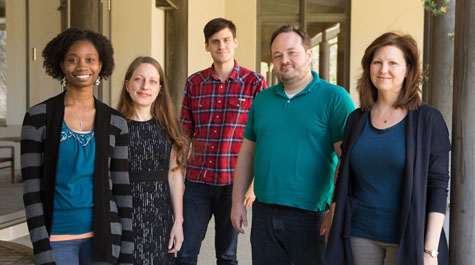Counselor education Ph.D. students Keosha Branch, Brian Kooyman, Clayton Martin and Becky Sheffield were sitting in one of their first seminar classes of the semester when Kooyman looked up from his computer and said that they’d won. Within seconds, their class came to a halt and the four doctoral students from William and Mary’s School of Education were receiving the congratulations of their peers and professor.
These four students had just received first place in the American Counseling Association’s Graduate Student Ethics Competition. The team spent several weeks in November and December writing a fifteen page response paper to a hypothetical ethical dilemma and were competing with teams from other doctoral programs across the country.
According to the contest website, they were required to defend their arguments with research from the ACA’s Code of Ethics along with several outside sources and were judged based on their identification of the problem, their proposed solution, their method of reaching that solution and their use of relevant ethical guidelines and literature.
According to Martin and Kooyman, the dilemma itself involved a potentially dangerous student and a counselor educator who received unauthorized information about him from a separate counseling program.
“This was like a Gordian knot of ethical conundrums,” Martin said. “It was just a mess.”
The students learned about the competition from Professor Eleni Honderich Ph.D. ‘14, who also served as their faculty advisor. Honderich herself was a member of the College’s first winning doctoral team in 2014 and understood the time commitments the students would have to make.
“Ask any student right before finals if they would like to volunteer for ten hours a week to write a paper (for no credit) … ah, we know what the response will most likely be,” Honderich said in an email.
Ask any student right before finals if they would like to volunteer for ten hours a week to write a paper (for no credit) … ah, we know what the response will most likely be” Honderich said in an email.
Kooyman and Martin both said that the extra workload was daunting at first, but, after an interest meeting with Honderich, her enthusiasm for the competition helped inspire them to meet the challenge. Each team member ultimately spent ten to 15 hours on the paper. They dedicated the last weekend before the paper was due to editing.
“We were reading it and reviewing what it is that we had all done previously and then finally we got this complete paper right at the eleventh hour,” Kooyman said.
Besides the time commitment, the team also had to deal with the ambiguity of ethics. The students began by confronting relatively unambiguous issues, such as those involving safety, before they moved on to more complex ethical conflicts. Through research, they devised a plan of action that took into account the effects any interventions would have on all of the parties involved.
According to Martin, the research showed that in ethics, there isn’t always a right answer.
“There aren’t necessarily ‘right answers’ as there are well-considered answers,” Martin said. “Answers that will potentially reduce harm … [and] consider the best interests of multiple parties.”
Each member of the team received a $100 gift card to any ACA bookstore, a certificate and a letter of recognition for their success. A second team of graduate students from the College placed second in a section of the competition reserved for master’s students.
The team is still waiting for specific feedback on their paper from the ACA.
Kooyman said that this competition has made him more interested in ethics and the way it could be part of his career.
“It’s made me more interested in teaching ethics,” Kooyman said. “It has made me a more ethical counselor and counselor educator …. It put ethics more in the forefront of my mind.”
It has made me a more ethical counselor and counselor educator …. It put ethics more in the forefront of my mind,” Kooyman said.

